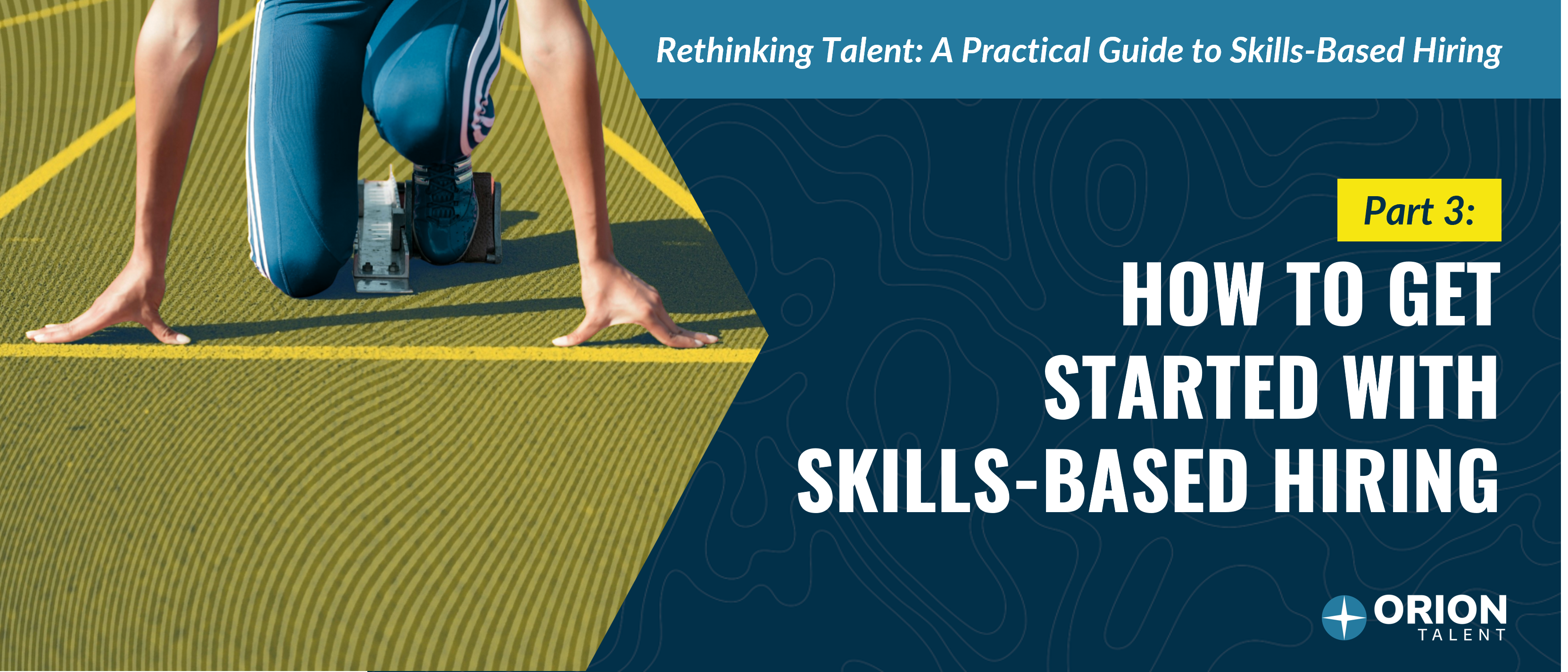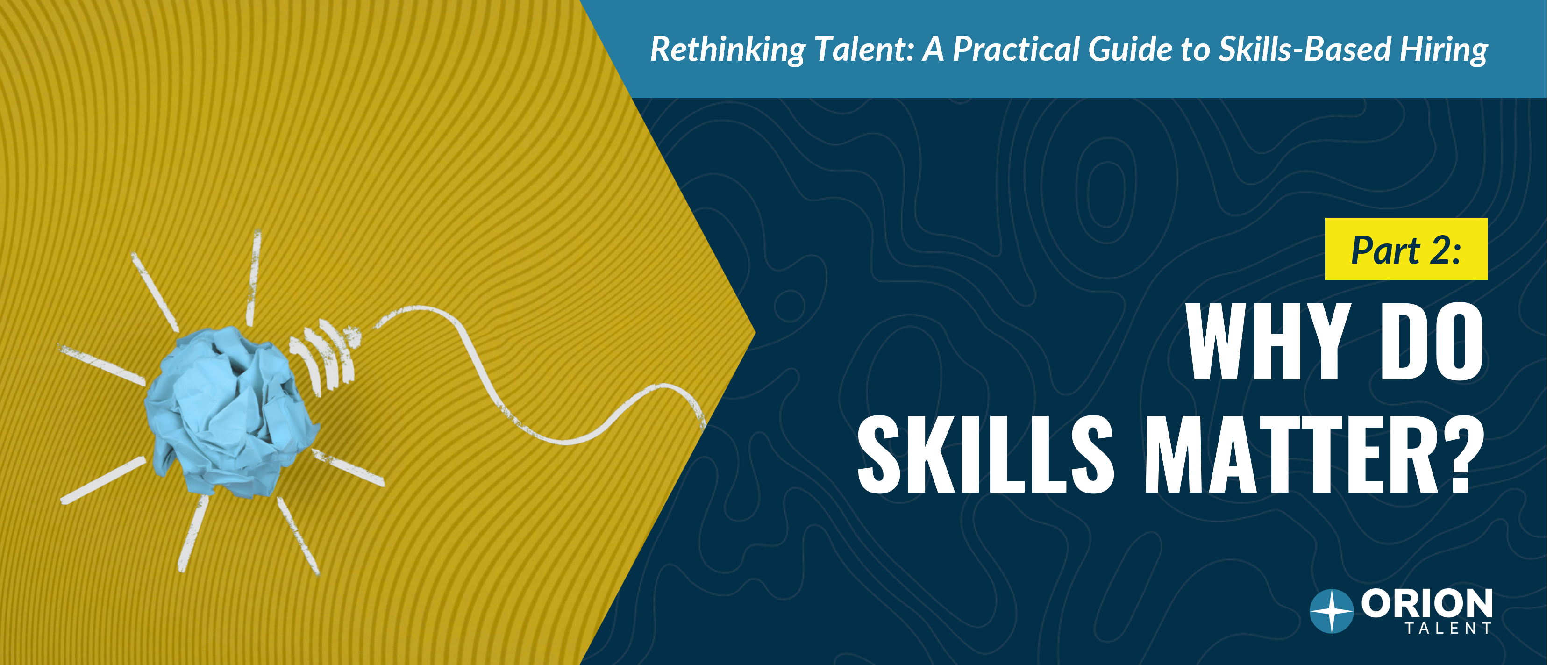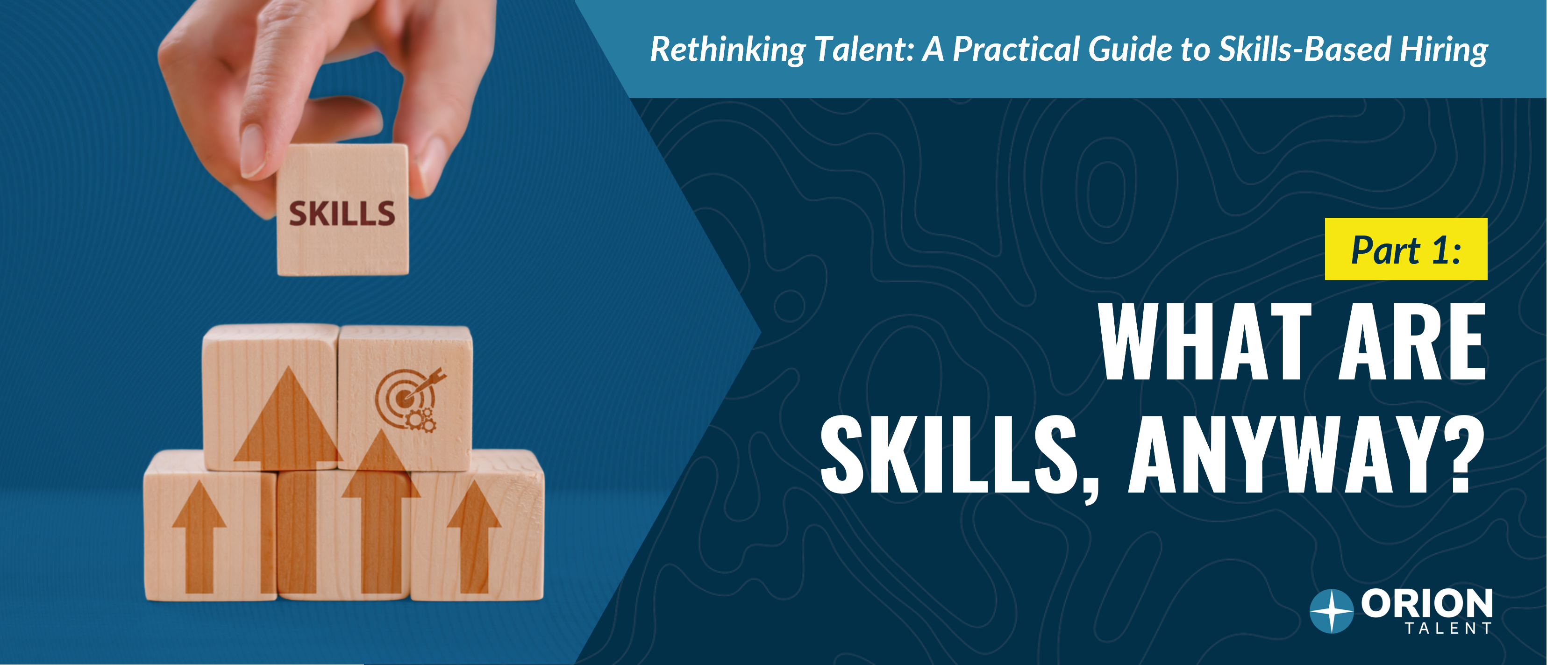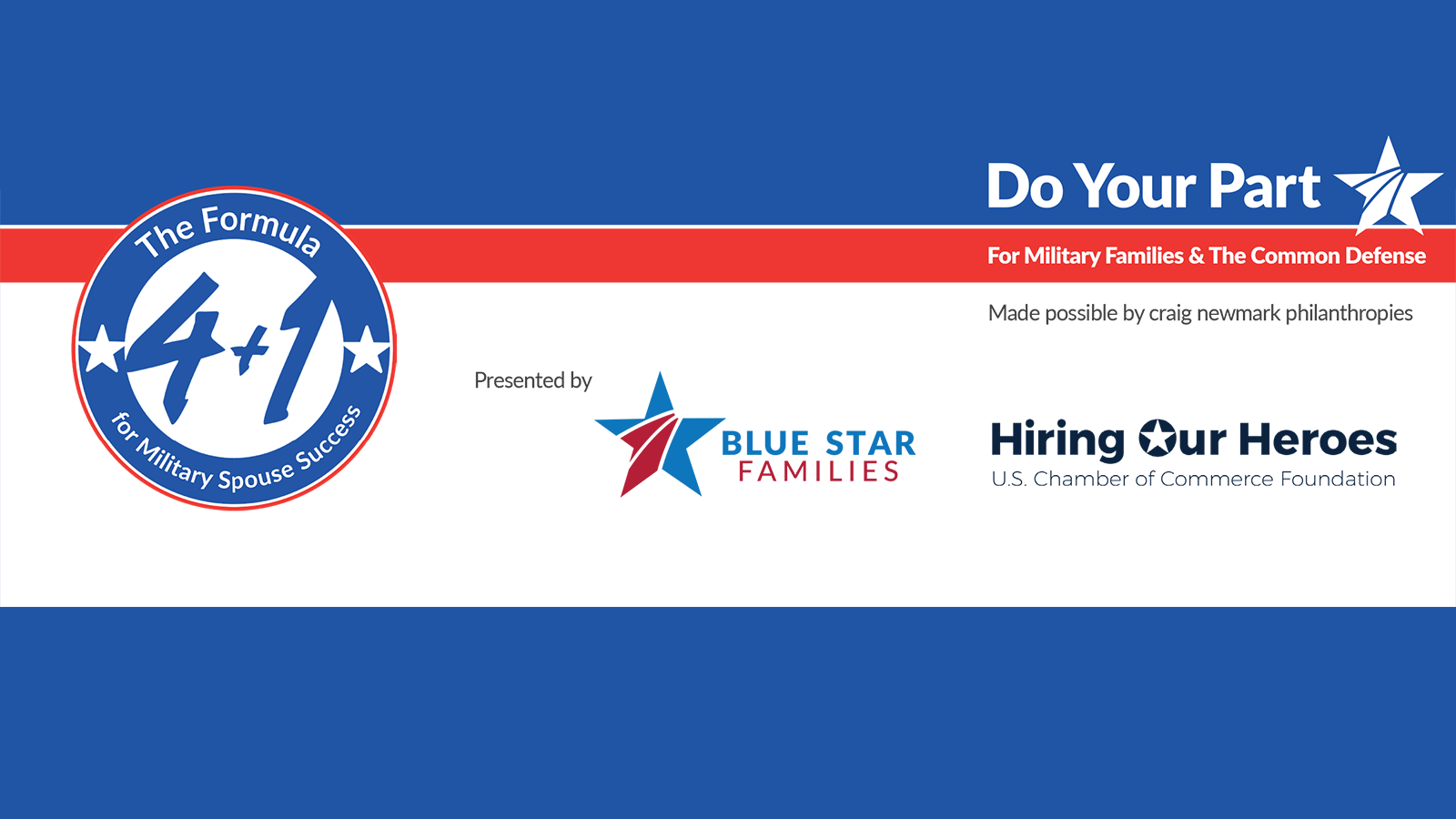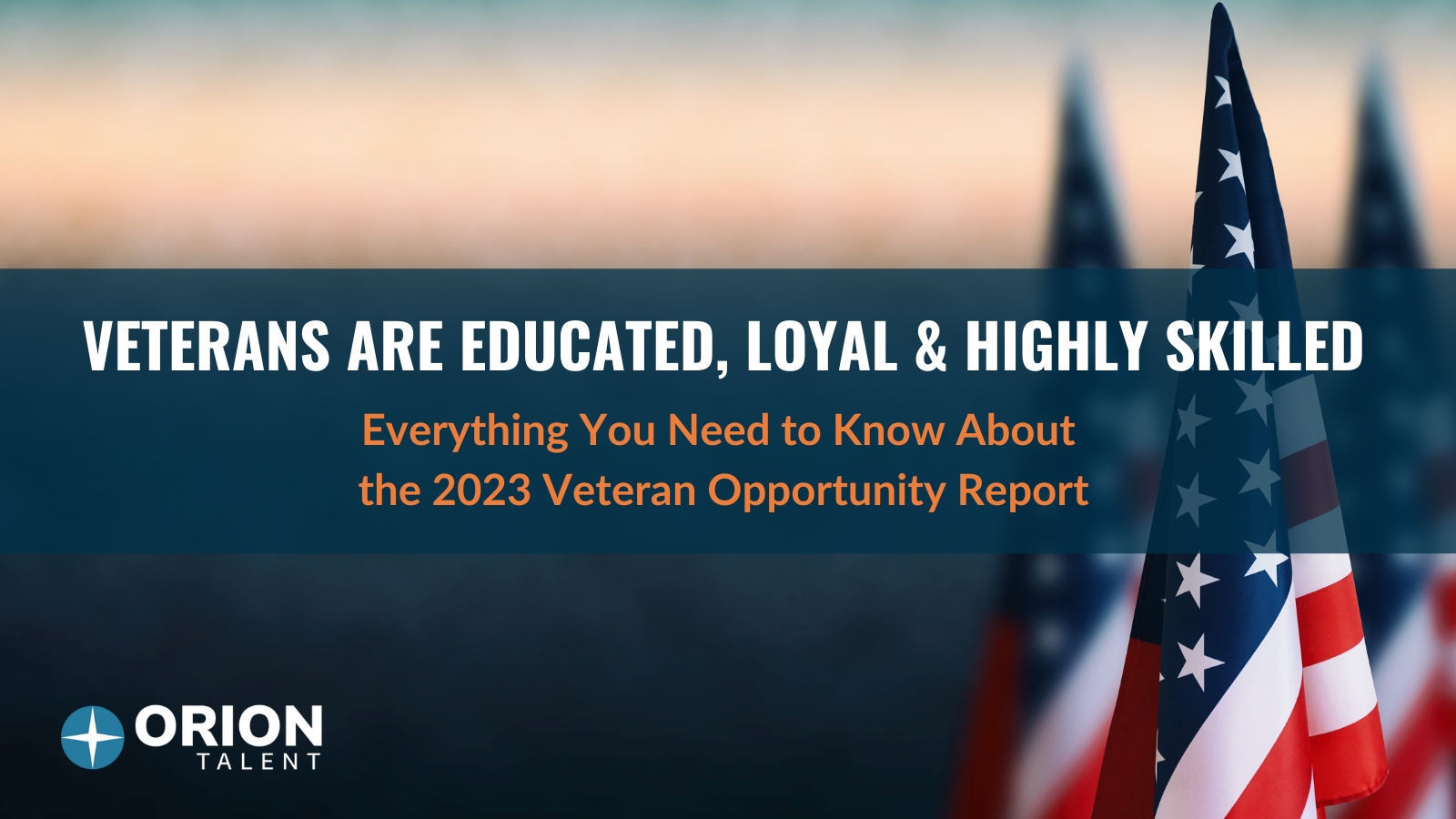
Military Veterans Have a Lot to Offer
U.S. Military veterans are highly educated, possess valuable in-demand skills and experience, have a proven track record of commitment and adaptability, and are less likely than non-veterans to leave their job within the first six months. Yet despite their education and expertise, veterans face challenges such as underemployment and undervaluation of their military experience.
LinkedIn recently released its 2023 Veteran Opportunity Report and it’s a must-read. Here’s a brief summary of what employers need to know about hiring veterans, the current state of veteran employment, what makes veterans stand out from the crowd, and the barriers they continue to face.
Background to the Report: How Did They Collect the Data?
The report draws insights from a comprehensive dataset comprising 2 million U.S. military veterans and 200 million nonveteran LinkedIn members with representation across military service, seniority levels, education, job functions, industries, and states.
U.S. Veteran Community Snapshot - September 2023
.jpg) As of September 2023, the U.S. boasts 18 million veterans, with 8.5 million actively contributing to the civilian workforce.
As of September 2023, the U.S. boasts 18 million veterans, with 8.5 million actively contributing to the civilian workforce.
There are currently 2 million veterans on LinkedIn. Of these, 11.8% are Gen Z, 46.8% are Millennials, 28% are Gen X, and 13.4% are Boomers. 82.8% are male and 17.2% are female, which is representative of the active-duty population. Time in service breaks down as such: 38% 0-5 years, 33.2% 5-10 years, 15.4% 10-20 years, and 13.4% 20+ years of service.
LinkedIn, with 2 million U.S. veteran members, reflects a demographic that spans generations, highlighting the diverse skills and experiences within the community. While veterans make up 5.5% of the civilian workforce, they face specific challenges that hinder their progression.
Key Report Findings
Despite their education, skills, and increasing representation in high-skilled jobs, veterans encounter barriers to reaching leadership roles. This calls for a reevaluation of hiring and promotion practices, emphasizing a skills-first approach that recognizes and utilizes the diverse talents veterans bring to the table. Here are a few key report findings:
Education
Veterans are a highly educated talent pool, with 60.5% holding a bachelor's degree or higher. Veterans are also 3x more likely to have a graduate degree than nonveterans.
Skills
61% of veterans' first civilian jobs are high-skilled, and 8 out of LinkedIn’s top 10 most in-demand skills are top veteran skills.
Underemployment
Despite having leadership as a top skill and nearly twice the work experience of nonveterans, veterans are only half as likely to reach director or vice president roles.
Retention
Debunking the myth that 50% of veterans leave their first job within six months, LinkedIn's data reveals that veterans are 27% less likely to leave their initial position.
Veterans Are Highly Educated
The robust education benefits provided by the U.S. Department of Veterans Affairs' Post 9/11 GI Bill contribute to a highly.jpg) educated veteran talent pool. 60.5% of veterans attain a bachelor’s degree or higher, compared to 22.8% of nonveterans. Veterans are three times more likely to have advanced degrees than their nonveteran counterparts. A significant percentage of the veteran population chooses to go to school after their military service to ease the transition into the civilian workforce.
educated veteran talent pool. 60.5% of veterans attain a bachelor’s degree or higher, compared to 22.8% of nonveterans. Veterans are three times more likely to have advanced degrees than their nonveteran counterparts. A significant percentage of the veteran population chooses to go to school after their military service to ease the transition into the civilian workforce.
Veterans Are Less Likely to Take Internships, Impacting Career Opportunities
A surprising finding indicates that veterans are less likely to take internships during their studies compared to nonveterans. Approximately 1 in 3 (30.4%) of nonveteran students participate in at least one internship, compared to just 5.3% of student veterans. This trend potentially limits their employment opportunities post-graduation, as internships often lead to full-time employment offers. Employers can bridge this gap by proactively recruiting student veterans for internships and ensuring transparency about compensation.
Veteran School Choice & Degree Pathways
.jpg) Understanding veterans' educational journeys is crucial for employers and policymakers. Approximately 50.4% of veterans start their bachelor's degree after military service. The most popular fields of study align with technical disciplines, reflecting the increasing trend of veterans entering high-tech roles.
Understanding veterans' educational journeys is crucial for employers and policymakers. Approximately 50.4% of veterans start their bachelor's degree after military service. The most popular fields of study align with technical disciplines, reflecting the increasing trend of veterans entering high-tech roles.
The most popular fields of study for student veterans are Business Administration and Management, IT, Computational Science, and Computer and Information Systems Security.
Data Analytics, Business Analytics, and Cyber/Electronic Operations and Warfare are the fastest growing fields of study in this community.
Employers can tap into this talent pool by incorporating student veterans into their campus hiring strategies.
Skills-First Hiring: Military Veterans Are High-Skilled Strategic Hires
Recognizing that veterans may have different career trajectories, employers must adopt a skills-first approach. Veterans bring transferable skills to the civilian workforce, with representation in high-skilled jobs increasing by 61% since 2016. They possess both hard and soft skills that contribute positively to the workforce.
Veteran Underemployment: Military Experience Is Undervalued
Despite the skills and leadership abilities veterans possess, military experience is often undervalued in the civilian.jpg) workforce. Veterans are half as likely to reach director or vice president leadership roles despite having nearly 2x more work experience than nonveterans. Leadership is also a top skill for veterans, but employers may not be taking full advantage of this.
workforce. Veterans are half as likely to reach director or vice president leadership roles despite having nearly 2x more work experience than nonveterans. Leadership is also a top skill for veterans, but employers may not be taking full advantage of this.
To address this, employers must rethink their hiring and promotion strategies, focusing on the skills and experience veterans bring to the table.
Retention: Continuing to Debunk the Turnover Myth
Contrary to the persistent myth that 50% of veterans leave their first civilian job within six months, LinkedIn's data shows that veterans are 27% less likely to leave their initial positions. Only 20% of veterans left their first job within their first 6 months, not unusual for new hires regardless of military experience.
Veterans’ likeliness to stay at a job longer than nonveterans is further reason to include and advocate for veterans in hiring strategies.
Recommendations for Employers
Military veterans make excellent employees, and they’re ready to apply their skills and experience at your company. Now is the time to get intentional about your veteran hiring strategy. Here are a few recommendations from the 2023 Veteran Opportunity Report:
1. Think Skills-First: Center skills in both hiring and promotion decisions, recognizing the unique contributions veterans bring to the workforce. Veterans’ work histories and academic backgrounds often look different than their nonveteran peers, but their in-demand skills will help your organization succeed.
2. Educate and Inform: Train managers and hiring teams to understand and value military experience as professional experience. Veterans have what it takes to excel in the civilian workforce.
3. Listen to Veteran Voices: Include employees with military experience in hiring processes and consider establishing veteran-focused employee resource groups (ERGs) to serve as both a source of knowledge and a supportive community for veteran hires.
4. Partner Up: Utilize available resources and programs available to your company that are designed to bridge the gap between veterans and employers, like Orion Talent.
Embracing the Value of Military Veteran Talent
.jpg) Embracing veterans as integral members of the workforce is a strategic investment in building a diverse, skilled, and resilient workforce. The LinkedIn 2023 Veteran Opportunity Report highlights the need for a paradigm shift in hiring and promotion practices, emphasizing a skills-first approach that benefits both veterans and the broader workforce.
Embracing veterans as integral members of the workforce is a strategic investment in building a diverse, skilled, and resilient workforce. The LinkedIn 2023 Veteran Opportunity Report highlights the need for a paradigm shift in hiring and promotion practices, emphasizing a skills-first approach that benefits both veterans and the broader workforce.
Veterans bring so much value to your team. They are educated and possess valuable in-demand skills and experience and a proven track record of commitment and adaptability. Veterans represent a diverse and competitive talent pool that can benefit employers and help them meet their objectives.
Are you ready to add more veterans to your team? Orion Talent can help! Orion offers the richest proprietary military database of leadership and technical talent within the industry. We help experienced, skilled, and committed military veterans find new careers with companies looking to expand their workforce, enhance their productivity, and improve their bottom line. Check out our Military Hiring Solutions to partner with us today.
Archives
- February 2026
- January 2026
- December 2025
- November 2025
- October 2025
- September 2025
- August 2025
- July 2025
- June 2025
- May 2025
- April 2025
- March 2025
- February 2025
- October 2024
- May 2024
- March 2024
- February 2024
- January 2024
- December 2023
- November 2023
- October 2023
- September 2023
- August 2023
- July 2023
- June 2023
- May 2023
- April 2023
- March 2023
- February 2023
- January 2023
- December 2022
- November 2022
- October 2022
- September 2022
- August 2022
- July 2022
- June 2022
- May 2022
- April 2022
- March 2022
- February 2022
- January 2022
- December 2021
- November 2021
- October 2021
- September 2021
- August 2021
- July 2021
- June 2021
- May 2021
- April 2021
- March 2021
- February 2021
- January 2021
- December 2020
- November 2020
- October 2020
- September 2020
- August 2020
- July 2020
- June 2020
- May 2020
- April 2020
- March 2020
- February 2020
- January 2020
- December 2019
- November 2019
- October 2019
- September 2019
- August 2019
- July 2019
- June 2019
- May 2019
- April 2019
- March 2019
- February 2019
- January 2019
- December 2018
- November 2018
- October 2018
- September 2018
- August 2018
- July 2018
- June 2018
- May 2018
- April 2018
- March 2018
- February 2018
- January 2018
- December 2017
- November 2017
- October 2017
- September 2017
- August 2017
- July 2017
- June 2017
- May 2017
- March 2017
- February 2017
- January 2017
 RSS Feed
RSS Feed

